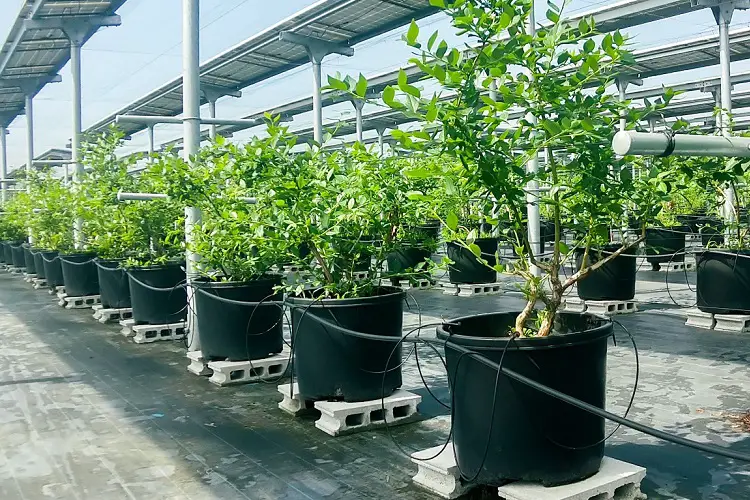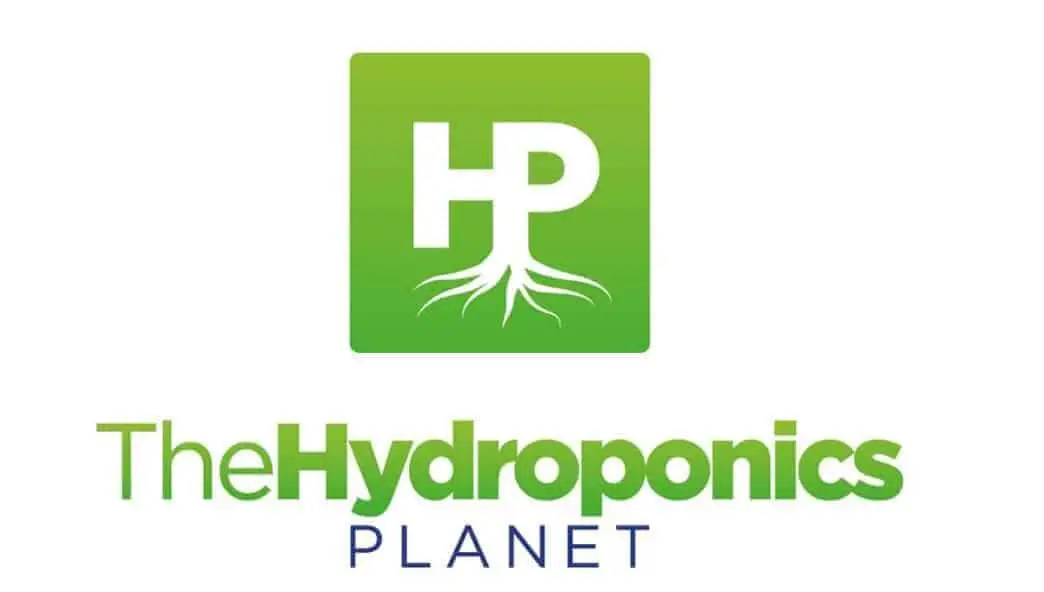Blueberries can be enjoyed fresh, frozen, or dried. It is a versatile fruit used in recipes, such as pies, jams, oatmeal, and pancakes.
They also make an excellent afternoon snack or topping for oatmeal or cereal.
Today, we’ll talk about growing blueberries at home in a hydroponic system so you can enjoy a more extended harvest season.
We will also cover the requirements, equipment, and processes to follow to enjoy delicious berries all year long. Let’s go!
Health Benefits of Blueberry

The blueberry plant is native to North America and has been cultivated since the early 1900s. They are small in size and are known for their hue ranging from blue to dark purple.
But despite being so small, these little berries pack a big punch when it comes to health benefits. They are, in fact, known as “superfoods” because they have a lot of health benefits for your body.
Here are some that might convince you to add blueberries to your diet.
High Antioxidant Content
Antioxidants are known for their ability to protect cells from damage, and they’ve been linked with everything from cancer prevention to brain health.
Blueberries are exceptionally high in a type of antioxidant called anthocyanins, which give the berries their blue color. Anthocyanins reduce inflammation, improve heart health, and even fight aging.
Help Fight Cancer
Numerous studies have shown that blueberries can slow tumor growth and promote cancer cell death. Blueberries’ antioxidants can also help protect healthy cells from damage caused by free radicals.
In addition, blueberries contain phytochemicals that can help reduce inflammation. Inflammation is a major risk factor for several types of cancer, so eating blueberries may help lower that risk.
Rich in Vitamins and Minerals
Blueberries are an excellent source of vitamins C and K. Vitamin C is a powerful antioxidant that helps protect cells from damage, while vitamin K is essential for blood clotting and bone health.
Additionally, blueberries contain small amounts of magnesium, iron, and calcium. Magnesium helps regulate blood pressure, while the iron is necessary for carrying oxygen in the blood. Calcium, of course, is essential for strong bones and teeth.
Improved Brain Function

Studies have shown that blueberries can help improve cognitive function and even reduce the risk of age-related dementia.
Researchers believe it is due to the high levels of antioxidants in blueberries. These antioxidants help protect cells from damage, including those in the brain.
In addition, blueberries contain nutrients like vitamin C and fiber that are essential for a healthy nervous system.
Manage Cholesterol Level
Studies have shown that blueberries contain compounds that can help reduce low-density lipoprotein (LDL) cholesterol – the “bad” cholesterol that can contribute to heart disease. In addition, blueberries are a good source of soluble fiber, which also reduces LDL cholesterol levels.
Fight Urinary Tract Infections
Blueberries contain compounds that can inhibit the growth of bacteria that cause urinary tract infections. In particular, the compounds seem to target a type of bacteria known as E.coli, which is responsible for many urinary tract infections.
While more research is needed to confirm these findings, the study hopes that blueberries may one day be used to help prevent or treat these common infections.
Benefits of Growing Blueberries Hydroponically

There are plenty of benefits of growing blueberries hydroponically. Below you will dins some of them, including longer harvesting times, higher yields, and more.
High Yields
Hydroponic blueberries have a higher yield than traditional blueberries because they are grown in a controlled environment and get more consistent care and attention. Plus, the lack of soil means less chance of pests or diseases affecting the plants.
As a result, hydroponic blueberry plants are generally larger and sweeter than their traditional counterparts.
Longer Harvest Season
Growing blueberries in a controlled environment where they receive the right amount of water, light, and nutrients ensure longer harvest times. This is excellent news for those who want to enjoy fresh and healthy blueberries all year round.
Less Water and Fertilizer
Hydroponic systems use a nutrient-rich solution instead of soil, which can help provide the plants with everything they need to thrive. In addition, hydroponic systems can be designed to use less water and fertilizer than traditional growing methods.
As a result, hydroponic blueberry plants may require less work overall, making them an excellent option for those who want to enjoy fresh berries with minimal hassle.
Better Growth and Rootedness
Hydroponic blueberries have a greater root system and growth than blueberries grown in soil. They also tend to be more disease-resistant and have more abundant crop yields.
And since they don’t need to be planted in soil, they can be grown in various environments, including urban areas. To improve your root system, even more, you might consider using hydroponic root health supplements.
How do I Grow Hydroponic Blueberries?

To grow hydroponic blueberries, you must start with a sterile growing medium and add a nutrient solution.
Blueberries require a pH between 4.5 and 5.5, so test your growing medium and adjust the pH accordingly. You will also need to provide adequate ventilation and light for your plants.
Once your plants are established, you need to water them regularly and fertilize them every two weeks with a nitrogen-rich fertilizer. Be sure to monitor the temperature and humidity levels in your grow room. Keep the moist and wet conditions because blueberry fruit loves water.
Types of Blueberries Suitable for Hydroponics
The two most popular varieties of blueberries for hydroponic cultivation are rabbiteye and highbush.
Rabbiteye Blueberry

Rabbiteye blueberries can be successfully grown using hydroponics. These types of blueberries require high humidity levels and must be kept moist, making them well-suited for hydroponic cultivation.
In addition, rabbiteye blueberries are relatively tolerant of poor growing conditions, making them ideal candidates for hydroponic cultivation.
Highbush Blueberry

This type of blueberry is distinguishable from other blueberries by its large size and firm flesh. They are also very sweet and have a distinctive flavor.
Highbush blueberries are notoriously tricky to grow in soil, so they’re usually grown in greenhouses or polytunnels. They require a long growing season and precise environmental conditions. However, hydroponics is an ideal nutrient solution for commercial growers.
Ideal Hydroponic Conditions for Blueberries
If you’re thinking about growing blueberries hydroponically, there are a few things you need to know to create the ideal hydroponic environment.
First, blueberries need a lot of light. They prefer full sun, so the light should be present for 12 to 16 hours if your hydroponic setup is outdoors. On the other hand, there should be access to plenty of artificial light for blueberry plants grown indoors.
Second, blueberries need acidic conditions to thrive. The ideal pH range for blueberries is between 4.0 and 5.5. You can adjust the pH of your hydroponic solution with vinegar or lemon juice if necessary.
Next, blueberry hydroponics requires a lot of water – at least 2 gallons per plant per day. Also, blueberries prefer cool weather and will not do well in temperatures above 80 degrees Fahrenheit. So if you live in a hot climate, you’ll need to take steps to keep your plants cool, such as shading them or using a cooling system.
Finally, blueberries grown in a hydroponic system need a humidity level of around 70% and a PPM level of 1200-1300. If the humidity level gets too low, the plants will suffer from stress and may produce less fruit. And if the PPM level is too high, the plants may experience diseases and pests.
Best Substrates for Hydroponic Blueberry Plants

To get good-quality hydroponic blueberries, you have to use substrates. Here are some of the best substrates for hydroponic blueberries:
Coconut fiber
Coconut fiber is an excellent substrate for hydroponic blueberries. It is lightweight and buoyant, making it easy to work with. It also has good water retention properties and is rich in organic matter, keeping plants healthy.
Peat Moss
Peat moss is another substrate used to grow blueberries hydroponically. It has a high water retention capacity, which helps keep the roots of your plants healthy. Peat moss is also rich in organic matter and is relatively light and easy to work with.
Hydroponic Setup for Blueberries

Below you will find three types of hydroponic setups for blueberries, each carrying distinctive characteristics.
Drip System
The drip system is the most popular setup for growing hydroponic blueberries. It delivers nutrients and water directly to the roots of plants via tubes and pumps. The most significant advantage of this hydroponic system is that it is easy to set up and maintain.
However, it is vital to ensure that the containers are large enough to accommodate the roots of the blueberry plants.
Ebb and Flow
This hydroponic system is well suited for blueberries because they require a lot of water and nutrients. In an ebb and flow system, plants are grown in pots placed in a tray. The tray is then filled with nutrient-rich water, and a pump circulates the water.
The pump runs on a timer, and the water flows into the pots and fills them up when turned on. Then, the water drains back into the tray when the timer turns off. This cycle is repeated several times throughout the day.
Thanks to this continuous flow of water and nutrients, plants are grown in an ebb and flow system tend to be healthy and productive.
Wick System
This system uses a wick to deliver water and nutrients directly to the plant’s roots, providing everything the plant needs to thrive. The wick hydroponic system is also easy to set up and maintain, making it an ideal option for beginners.
Best of all, this hydroponic growing technique is versatile and can be used to grow various plants, not just blueberries.
How Long Does it Take to Grow Blueberries Hydroponically?

It can take three to five years for a blueberry plant to produce consistent bumper crops. Blueberry plants grown hydroponically, however, can give a faster return on your investment, with fruits appearing in the second growing season.
While soil-grown blueberries are generally harvested in the spring, hydroponic blueberries may be cultivated all year. Once a blueberry bush begins to bear fruit, it can produce fruit for up to 50 years.
Pruning Your Blueberry Plant
Pruning is an essential part of maintaining healthy plants. Not only does it help remove dead or damaged leaves and stems, but pruning it also promotes new growth.
However, pruning hydroponic blueberries can be tricky, as the plants are easily damaged. The best time to prune blueberries is in early spring, before the plant begins to produce new growth.
To prune, cut the plant by about one-third to encourage it to produce new shoots, resulting in more fruit. Be sure to use sharp pruning shears and handle the plant gently to avoid damaging the delicate leaves and stems.
Pruning blueberry bushes improve the shape, structure, and growth rate of hydroponically grown plants, so make sure to do it as needed.
When Should I Harvest Blueberries?

You probably can’t wait for the harvest season if you’re lucky enough to have a blueberry bush in your backyard. But how can you tell when the berries are ripe and ready to pick? Here are a few tips to help you out.
First, take a look at the color of the berries. Ripe blueberries will be a deep blue, almost purple color. If they’re still green or white, they’re not quite ready yet. Second, give the berry a gentle squeeze. If it pops easily, it’s ripe.
It needs more time on the bush if it’s hard or unyielding. Finally, take a sniff! Ripe blueberries have a characteristic sweet aroma. If you don’t detect this scent, the berries aren’t quite ready to eat.
Sulfur for Hydroponic Blueberries
Sulfur is one of the most vital nutrients for hydroponic blueberries. This micronutrient helps photosynthesis and is needed for chlorophyll formation. Sulfur is available in sulfate, which is the preferred form for plants. Sulfur can be applied as a foliar spray or drench.
When applying sulfur to your blueberry plants, be sure to use a product that is specifically designed for use with hydroponics. As sulfur is one of the major nutrient elements for blueberries, you’ll want to apply it once every two weeks or so.
How to Spot Nutrient-Deficient Blueberries
Yellowing of the leaves and veins is one sign of nutrient deficiency in hydroponic blueberries. Another indication is when leaf tips curl downwards and turn yellow, or newer leaves come in paler than those produced early on. This can also cause stunted growth in your blueberries.
When you see these signs, you should check your pH levels and ensure that the blueberry plants absorb nutrients to ensure they are sufficient for your blueberry plant to thrive.
Conclusion
If you’re looking for a fun and productive way to garden, hydroponic blueberries may be perfect for you.
Not only are they easy to grow, but you can also enjoy the benefits of homegrown blueberries all year. We hope you found our tips helpful and have a successful blueberry harvest next season!
Have you grown hydroponic blueberries before? What tips would you add?





